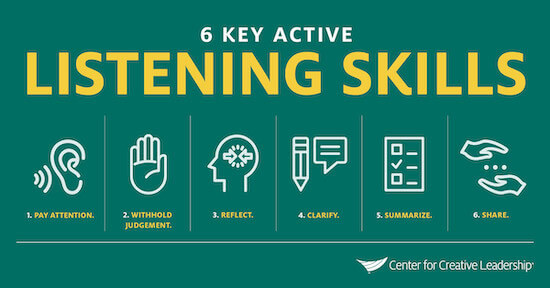
Coaches listen, am sure you know that is part of the role, but how clear are you (are all of us!) on what it really takes to be an effective listener?
Today I am highlighting what it means to listen without judgement, then what can then come after that, depending upon the client, the situation, as well as the role they wish the coach to play. I’ll then finalise by sharing a few thoughts around what it takes to, after listening, “reflect, then clarify” at an advanced level.
The graphic above is from the Center for Creative Leadership (CCL) and is a nice summary of six active listening skills, distilled in a linear fashion as a listening process.
First, let us look at the word judgment. In the purest form, this is to be absolutely without bias or opinion, to have a completely open mind and simply listen actively and intently, with full presence. However, and I speak from many years experience, the work we must do in order to effectively listen without judgment is the practice of a lifetime, as all of us have our biases, so to be fully and completely open of mind as we listen is a key part of the work that enables us to listen.
Spinning Plates
To illustrate, then give you a tool to use, when you listen to someone next, check how long it takes before you form an opinion on something they say. You normally know this as you come up with something to reply with when it is “your turn”. When active listening, however, it is never “your turn”, this is not a true two-way conversation, you are listening, you are there for the other person, you only speak to, as the graphic says, “reflect, then clarify”.
“But I can’t get that idea out of my head, i need to stop them and reply!” is a common response to what I just noted. If the person saying that is open, I’d then share a) that as long as you are waiting to reply, you are no longer truly listening, and b) to get the thought out of your head, imagine you are a vaudeville act, someone who spins plates. For the idea that is now very much front of mind and stopping you from listening, create a visual picture of it being a plate, then pick it up, take a pole, spin the plate off to the side and leave it spinning. The human mind and memory are amazing, once you consciously do this, you can then mentally reach and pick it up if it is still relevant later (I recommend waiting an absolute minimum of 5-10 minutes before considering doing that!). In the meantime, as long as you have moved it from the front of your mind and set the plate spinning, you are back to active listening.
What does it mean to “Reflect, then Clarify” – advanced level
For a concise explanation of what is meant in active listening to “reflect, then clarify”, the article linked above is useful. In summary, the core is to ensure you are clear on what the other person is telling you, as well as that they are totally clear.
For active listening, that is sufficient. For coaching, you are also there to ask the right questions to support the other person in probing what is really going on for them “at source”.
In my experience, at an advanced level (I am always practising and learning, and at the same time, have a degree of mastery by now), when you are fully and deeply present and listening, the best questions for the moments come without you thinking about them at all. They come from what I call “listening for energy“, for when, as you listen, you sense a gap or dissonance or confusion between what they are saying and the energy they are giving off as they say it. From this, sometimes the most amazing questions come forward unbidden, opening things right up for the other person.
One more note is that there is also enormous value for leaders of large and complex organisations to have a coach or sounding board who deeply understand business and finance, so that when the leader talks through a situation and relates numbers, $, £ to it, the coach can often sense a dissonance there in the importance of the issue to the leader relative to the business or financial significance of it. To be honest, I know some great coaches who listen wonderfully, yet they have no such deep business and finance understanding so that leaves open real possibilities of gaps in what their client is communicating remaining unnoticed.
Energy, complexity, scale. Instinctively these words all are key to being of the highest value to senior leaders and go beyond listening to relecting and clarifying through sensing gaps and dissonance and so asking the right questions.
